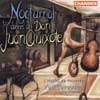Nocturnal dances of Don Juan Quixote
Thoroughly entertaining musicmaking of less familiar cello and orchestral fare
View record and artist detailsRecord and Artist Details
Composer or Director: Aulis Sallinen, Béla Bartók, Mario Castelnuovo-Tedesco, Leonard Bernstein, Paul Hindemith
Genre:
Orchestral
Label: Chandos
Magazine Review Date: 10/2002
Media Format: CD or Download
Media Runtime: 61
Mastering:
Stereo
DDD
Catalogue Number: CHAN9973

Tracks:
| Composition | Artist Credit |
|---|---|
| (3) Meditations from 'Mass' |
Leonard Bernstein, Composer
(I) Musici de Montreal Leonard Bernstein, Composer Yuli Turovsky, Cello |
| Chamber Music III, '(The) Nocturnal Dances of Don |
Aulis Sallinen, Composer
(I) Musici de Montreal Aulis Sallinen, Composer Yuli Turovsky, Cello |
| Trauermusik |
Paul Hindemith, Composer
(I) Musici de Montreal Paul Hindemith, Composer Yuli Turovsky, Cello |
| Rhapsody No. 1 |
Béla Bartók, Composer
(I) Musici de Montreal Béla Bartók, Composer Yuli Turovsky, Cello |
| Figaro a concert transcription from Rossini's 'The |
Mario Castelnuovo-Tedesco, Composer
(I) Musici de Montreal Mario Castelnuovo-Tedesco, Composer Yuli Turovsky, Cello |
Author:
I Musici de Montréal have a habit of putting together fascinating programmes‚ and this – incidentally showcasing Yuli Turovsky’s solo skills – is no exception. Their musicianship is amply confirmed in Bernstein’s Three Meditations from ‘Mass’ (1977)‚ effectively his cello concerto. A compact‚ kaleidoscopic set with organ‚ strings and percussion accompaniment‚ the brief central variations play havoc with a motif from Beethoven’s Ninth. The composer’s own account‚ with dedicatee Rostropovich‚ remains definitive but the newcomer’s merits are considerable.
The players clearly relished the titletrack‚ Sallinen’s partpastiche‚ partnightmarish Chamber Music III (198586)‚ a work where – as with much of his later music – context is all in unravelling the web of meaning. This excellent new version scores over its rivals‚ part of allSallinen issues‚ in warmth of sound. As interpretations‚ there is little to choose between them. Rondin is still the fleetest at 19'25"‚ but both Thedéen and Turovsky highlight more the music’s subversiveness.
It is good to see another outing for Hindemith’s Trauermusik on the cello rather than the viola (it was designed to be played on violin‚ viola or cello). Turovsky’s is a nicely shaped‚ tender performance‚ making a wonderful contrast between Sallinen’s work and Bartók’s Rhapsody No 1 (1928). Bartók arranged the violinandpiano original for cello‚ and later for violin with orchestra‚ so this version for cello and orchestra required little manipulation. Not too many years ago‚ the Hungarian’s was still a name to frighten the horses but in Turovsky’s hands the Rhapsody – still perfectly Bartókian – sounds about as problematic and certainly as appealing as Dvo·ák’s Slavonic Dances. CastelnuovoTedesco’s morethanmeretranscription of Rossini’s ‘Figaro’ aria‚ flashily recorded once by Vanessa Mae in a different arrangement‚ is a delight in Darren Fung’s and caps a splendid disc. Warmly recommended.
Discover the world's largest classical music catalogue with Presto Music.

Gramophone Digital Club
- Digital Edition
- Digital Archive
- Reviews Database
- Full website access
From £8.75 / month
Subscribe
Gramophone Full Club
- Print Edition
- Digital Edition
- Digital Archive
- Reviews Database
- Full website access
From £11.00 / month
Subscribe
If you are a library, university or other organisation that would be interested in an institutional subscription to Gramophone please click here for further information.




